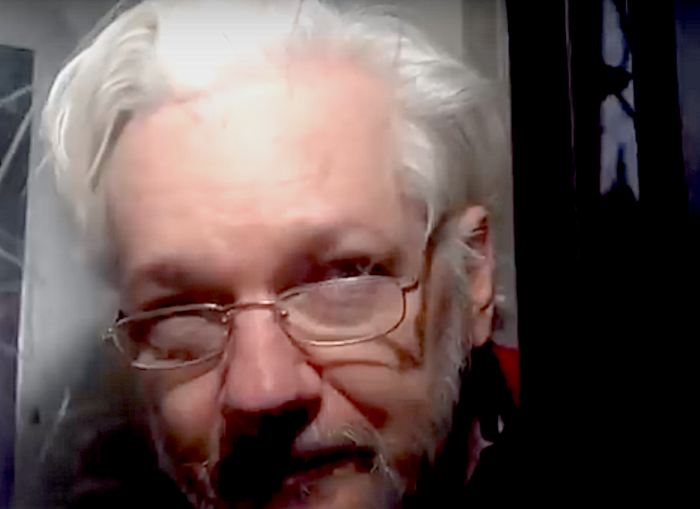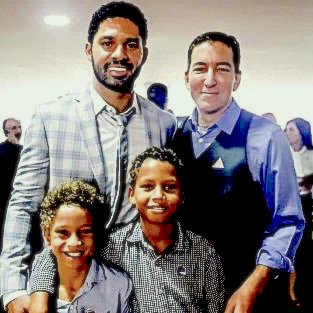Assange Extradition Hearings Scheduled as Assault on Press Freedom Spreads
by Nozomi Hayase, Consortium News:

The day after journalist Glen Greenwald was charged with cyber crimes in Brazil, the timetable for the WikiLeaks publisher’s extradition case was set in London, writes Nozomi Hayase.
At the hearing on Wednesday, at Westminster in London, the timetable for Julian Assange’s U.S. extradition case was worked out. Assange’s U.S. legal teams applied to have the extradition hearing split. His defense lawyer, Edward Fitzgerald, emphasized to the court that they won’t be ready to call the main body of their evidence until after the first week of the hearing, which is now set to start at the end of February.
Assange’s extradition hearing is now set to proceed in two parts: From the beginning of Feb. 25, for one to two weeks and then to resume on May 18 for three more weeks.
Assange has been indicted on 17 counts of espionage for publishing of documents concerning the U.S. wars in Iraq and Afghanistan, and torture in the Guantanamo Bay prison. During his previous hearing on Monday, Jan. 13, his lawyer, Gareth Peirce, raised concern that Assange’s lack of access to legal counsel had made it difficult for him to adequately prepare for his defense as he faces sentences that carry prison time of up to 175 years.
Recently, new evidence has emerged showing that the CIA hired the Spanish security company, US Global, to spy on Assange inside the Ecuadorian embassy in London, while Assange was living under political asylum. The targets of this surveillance included his lawyers, doctors and visitors. Now, three former employees of the company came forward as witnesses confirming that their then-boss, David Morales, ordered workers to install new embassy video cameras with audio recording capacity in December 2017.

Juilan Assange leaving London court in a police van, Jan. 13, 2020. (Ruptly video screenshot)
Outside the court after the hearing, WikiLeaks editor-in-chief Kristinn Hrafnsson said, “We have now learnt from submissions and affidavits presented by the US… that they do not consider foreign nationals to have a First Amendment protection.” He reiterated how this is a political persecution of a journalist, and is a grave attack on press freedom worldwide.
John Reed, a representative from “Don’t Extradite Assange,” the U.K.-based campaign effort set up by WikiLeaks, also spoke to the press:
“If Assange is extradited he will immediately be placed under ‘Special Administrative Measures‘. That means that he will not be able to speak to the press or the public, and neither will his legal team… He will be put in a black hole … .”
He then alerted the public, “This is war on journalism. No journalism can be safe in this current prosecution. If the trial of Julian Assange is allowed to go ahead, this would happen.”
Press Freedom Warnings
Assange’s legal team has been warning about the threat to press freedom by the U.S. government’s judicial overreach in prosecuting a foreign journalist with a two-edged sword that both denies First Amendment protection and applies the Espionage Act.
The established media sounded the same warning when the charges against Assange were revealed in late 2018. The New York Times wrote that “charges centering on the publication of information of public interest …would create a precedent with profound implications for press freedoms.” The Atlantic ran a commentary saying, “If the U.S. government can prosecute the WikiLeaks editor for publishing classified material, then every media outlet is at risk.”

Glen Greenwald, at right, with his family in Brazil. (Twitter)
Now, the “Assange precedent” seems to be extending its reach. On Tuesday, Glenn Greenwald, a journalist at The Intercept, was charged with cybercrimes in Brazil. Press-freedom groups swiftly came to his defense, condemning the Brazilian government’s act of criminalization of journalism. James Jaffer, director of the Knight First Amendment Institute at Columbia University, pointed out the striking similarities between Greenwald’s case and that of Assange:
“Terrible to see this. The theory that journalists can be prosecuted for publishing info that others obtained unlawfully (which I assume is the theory here, notwithstanding prosecution spin) is of course the basis for the US’s indictment of Assange, too.”
As the assault on the First Amendment escalates around the globe, Assange, a prisoner of this war, remains in complete isolation in Belmarsh Prison in London. Since Sept. 22, 2019, he has been detained solely for the purposes of the U.S. extradition request.
The UN Special Rapporteur on Torture, Nils Melzer, has raised concerns and indicated that Assange, whose health has entered a ‘downward spiral’ inside prison, is a victim of psychological torture.
Read More @ ConsortiumNews.com
Loading...


